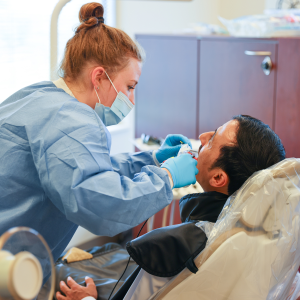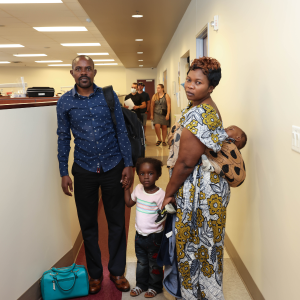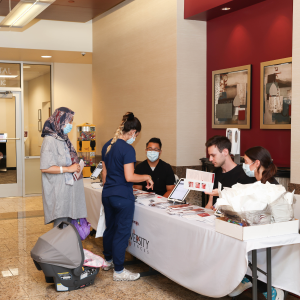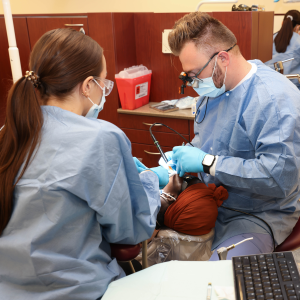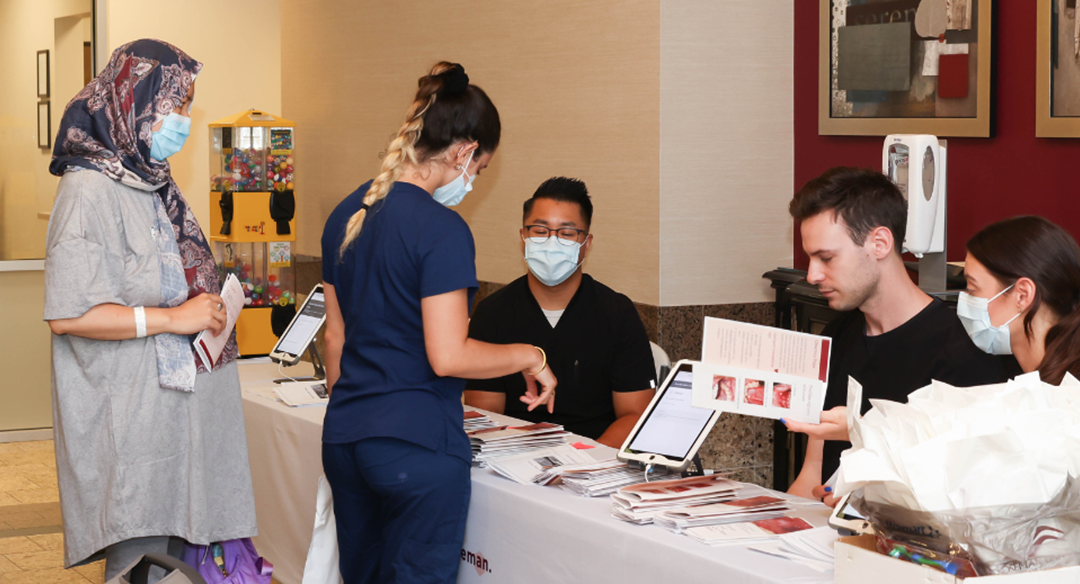
by Roseman Dental | Sep 7, 2022 | Clinic Events - UT, Dental 360, Dental Clinic Blog, Providers - UT, Roseman Dental - UT
In conjunction with Catholic Community Services of Utah, College of Dental Medicine (CODM) at Roseman University of Health Sciences provided free dental care for 150 refugees living in Utah on August 19, 2022. In recent months, Utah has had an influx of refugees from Ukraine, Afghanistan, Sudan, Venezuela, Honduras, Syria, Uganda, China and Congo.
According to an article in the National Library of Medicine, during periods of displacement, relocation, and adaptation, refugees are often forced to prioritize other immediate needs – such as food, shelter, and safety – before addressing oral health concerns. However, oral health is often a significant health issue. Refugee populations have consistently been shown to have worse oral health even when compared to traditionally disadvantaged and underserved populations in their host country. Factors contributing to this health care disparity include lack of oral health care infrastructure in source countries, challenging migration trajectories, difficulty accessing care upon arrival to host countries, and individual health beliefs and practices.
“As a result of a lack of oral health care, refugees suffer pain, stress, and negative self-perception,” said Dr. Ryan Moffat, Assistant Professor for the CODM at Roseman. “When refugees are placed in cultures which highly value the cosmetic appearance of teeth, poor dentition can carry a strong social stigma, decreasing chances of employability and creating social challenges for children in school. Frequently missing work because of emergency dental treatment needs could result in employment termination and educational opportunities can be affected.”
Give New Utahns a Smile is an effort to address the immediate needs of these refugees. Fortunately, at CODM, many students come from a variety of cultural backgrounds and spoke the language of many of the refugees. Students addressed the immediate dental needs the clients had and provided comprehensive oral examinations, dental cleanings, and dental restorations free of charge.
Among those who received dental care that day was Fareed Poya Masouda, a refugee from Afghanistan, and his wife. Masouda worked as an interpreter for the U.S. Army in Kabul prior to its withdrawal from the country.
“It’s an incredible help,” Masouda said of the dental clinic. “The way I see it, is they are taking care of every part of us, whether it is medical concerns, dental – it’s incredible.”
The Masouda’s have three children ages 7, 5 and 3; the family has been in Utah for three months.
“I really appreciate all the people who helped us, who saved our lives,” Masouda said. “Now we are really happy, with our kids going to school. My wife is happy and there is no stress anymore and no depression anymore. We’re really excited and happy to be here without fear of being threatened, of being killed or tortured.”
Follow-up services will be provided for free to those refugees who participated in the clinic last month.
“We would love to continue this kind of relationship with this community of refugees,” Moffat said. “They are wonderful individuals, and they have a need. We feel like they have a lot to contribute to our community here in Utah. If we can provide them with an opportunity to have a nice-looking smile and good oral health, we feel like that will help these refugees be able to continue to contribute.”
CODM recognizes there are many other refugees in Utah, in addition to the 150 seen last month, who have significant oral health needs. As such, CODM hopes to assist Utah refugees through future similar events.

by Roseman Dental | Sep 7, 2022 | Dental 360, Dental Clinic Blog, Oral Health, Roseman Dental - NV, Roseman Dental - UT
Xerostomia is a big word with a simple definition: dry mouth. It’s the term for the absence of saliva in the mouth that can cause discomfort, often leading patients to seek medical treatment. The condition isn’t a disease in itself, but is actually caused by other factors.
While everyone experiences a dry mouth at one time or another, chronic dry mouth can not only be frustrating, but can also cause medical and dental issues. Treating xerostomia is important to improve overall quality of life as well as preventing any additional problems.
What Causes Xerostomia?
Many different issues can cause dry mouth. Some of the causes for this common condition include:
- Medications. Many over-the-counter and prescription drugs list dry mouth as a side effect.
- Nerve damage. Damage to the nerves that control saliva production can result in xerostomia.
- Cancer treatments. Chemotherapy drugs or radiation can halt the production of saliva.
- Other diseases. Parkinson’s or Sjogren’s syndrome can affect the salivary gland.
Other conditions, including stress and depression, can lead to a lower production of saliva as well.
What Problems does Xerostomia Cause?
Leaving xerostomia untreated can lead to further issues. The condition can cause difficulties with speech and eating, as well as an increase in cavities or infections in the mouth, since salvia helps wash away bacteria from the surface of the teeth.
What is the Treatment for Xerostomia?
To begin treatment for xerostomia, its root cause must be discovered. Eliminating the cause isn’t always possible, so dental professionals will find a treatment option that addresses the issue while not detracting from other medical care.
Some remedies can treat dry mouth, but they won’t cure it. These options include avoiding alcohol-based mouthwashes, using artificial saliva, sipping plain water, or using over-the-counter dry mouth products. Prescription medications can be used to stimulate saliva production in order to replace the saliva and prevent other medical and dental issues.
Dry mouth should be treated not only because of the discomfort it causes, but also because of the serious issues it can cause. Prioritize good oral care and regular dental treatments to prevent further problems. If you’re in need of dental care, make an appointment with Roseman Dental to get help from one of our empathic, patient-focused providers.

by Roseman Dental | Sep 7, 2022 | Dental 360, Dental Clinic Blog, Oral Health, Roseman Dental - NV, Roseman Dental - UT
Periodontal disease occurs when the plaque that adheres to the teeth is not effectively removed. Plaque forms when bacteria in the mouth combine with mucus, creating a sticky and damaging substance that attaches to the teeth. Brushing and flossing regularly does certainly help minimize the formation of plaque, but any plaque that remains often turns into something called tartar, which cannot be easily brushed or flossed away at home. This is just one reason regular dentist visits are so essential!
To reduce the chances of developing gum disease, it’s important to recognize risk factors. Here’s a look at some of the things that commonly lead to gum disease and ways to prevent them from getting that far:
Genetic Makeup
Each person’s genetics play an important role in determining how healthy their teeth and gums are. So much so, in fact, that some researchers believe that as much as 30% of the population is especially susceptible to gum disease. However, even those who are predisposed to the issue can dramatically reduce their chances of developing it simply by engaging in strong oral hygiene practices. In this case of nature vs. nurture, go for nurture.
Stress Levels
While stress in and of itself isn’t a direct contributor to periodontal disease, it has a tendency to weaken the overall immune system. This means that fighting off infections will be tougher in general. In other words, if you’re in the beginning stages of gum disease and are particularly stressed out, it will likely exacerbate the problem. Talk to a doctor if you need help managing stress and its affects.
Smoking Habits
If someone doesn’t already suffer from periodontal disease, smoking may cause it to develop. If someone is a smoker and already has symptoms of gum disease, continuing the habit will only make the problem worse. The more someone smokes, the greater their risk, so cutting down an existing habit (or better yet, quitting entirely) can pay off in the form of improved oral health.
There are many risk factors associated with periodontal disease. The easiest and most effective ways of reducing the chance of developing it is to practice strong brushing and flossing habits, and visit the dentist at regular intervals. If your next appointment isn’t on the calendar yet, make one with Roseman Dental to keep those gums and teeth healthy.


